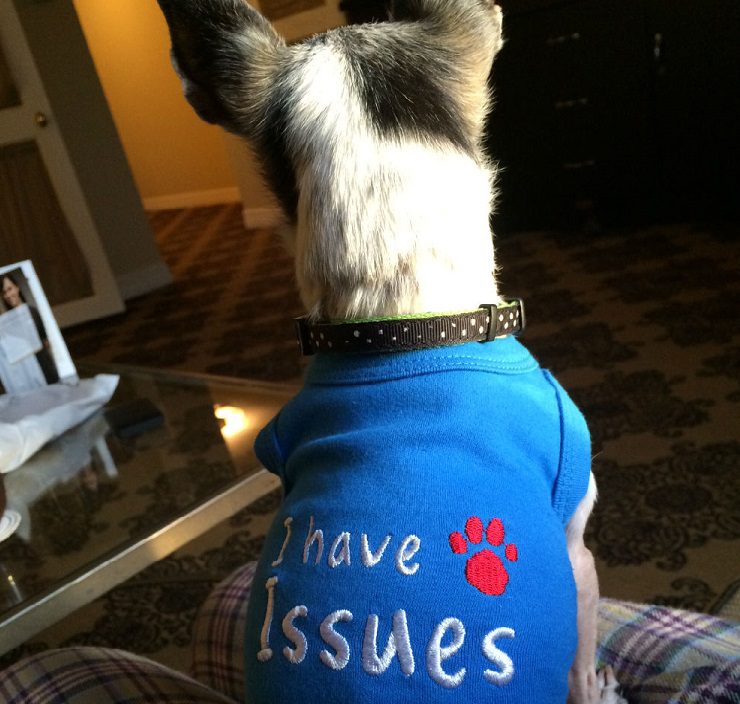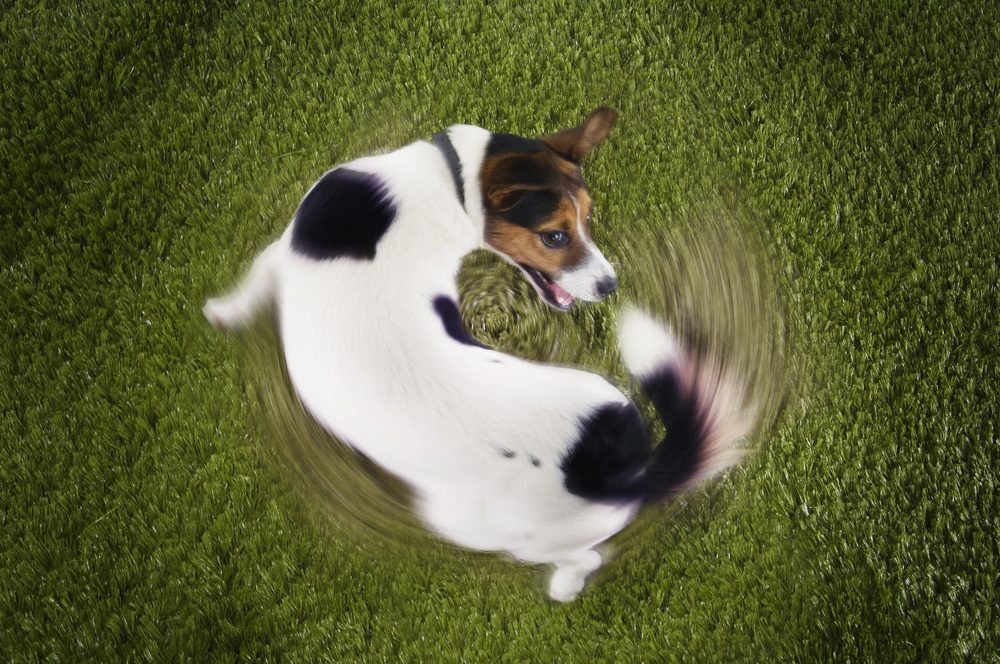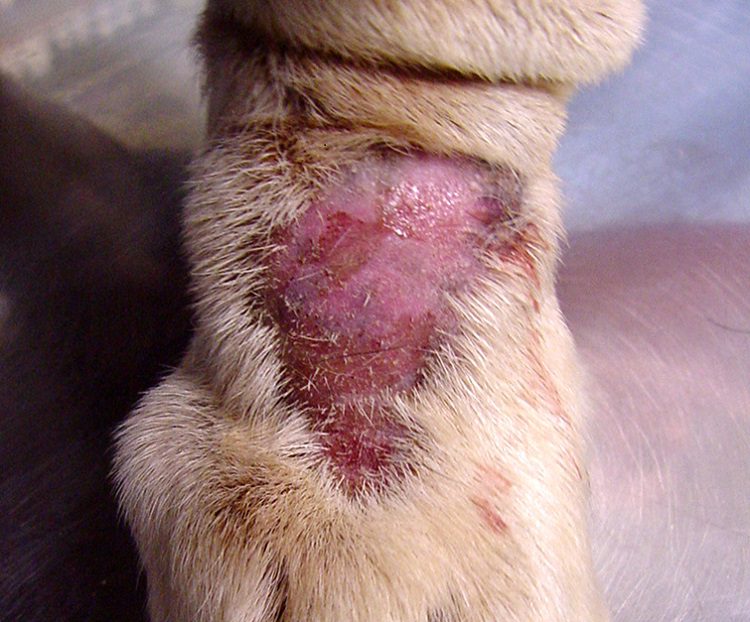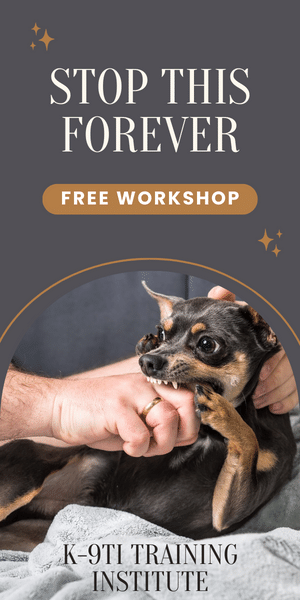Chihuahuas and OCD
Have you ever wondered if dogs can get OCD? Does your Chi lick, chew, spin, chase his tail, or run after shadows, or just act weird? Chances are your dog has OCD.
Those who know me have heard me say many times, (affectionately, of course) that our dog, Chico has always had “issues”. In October of 2014, we moved into a new house. The house we lived in before the move was the only home he had ever known since he was 8 or 9 weeks old.
Can dogs have OCD? Most dogs are creatures of habit and need a routine, but if a change happens, they usually adjust pretty quickly. Chico, however, has always had trouble adjusting to a new routine or environment. We knew it would take time for both our dogs (we only had two then) to adjust to the new situation. Pebbles took hardly any time at all to adjust, she is just a happy little camper wherever she is as long as she is with her “peeps”. On the other hand, Chico had a more difficult time adjusting and his OCD seemed to gradually get worse. As of March 14, 2017, he turned 14 and we weren’t sure if it was because of the move or his age or both. Most likely, I think it was a combination of both.

So, I started wondering, can animals have OCD (Obsessive Compulsive Disorder) as people do? When looking for the answer, this is what I found. I thought I’d share it with you because I know others may be coping with their pet’s obsessive behaviors.
UPDATE:
We lost our beautiful Chico on July 17, 2020:
Can dogs really have OCD? What the Experts Say:
According to PET MD, pets can have obsessive-compulsive (OCD) behaviors. According to them, obsessive-compulsive disorders include thoughts, which don’t apply to animals because we don’t know what they are thinking, even if we sometimes think we do. So, in animals, we call them compulsive behaviors. Another source, however, called the Obsessive-Compulsive Disorders and that people and animals can develop them. So, it seems that even the experts can’t agree on exactly what to call them. Whatever you call them, disorders or behaviors, the experts agree that dogs can have obsessive behaviors. The behavior can be distressing for both animal and human. For the sake of simplicity, I will call them disorders.
Andrew Luescher, a veterinarian who is the director of Purdue University’s Animal Behavior Clinic, has found that many dogs even have emotional disorders that are more commonly associated with humans than pets. Luescher, one of about 30 board-certified animal behaviorists in the country, estimates that about one dog out of 50 suffers from a canine compulsive disorder.
What are compulsive disorders?
One source described them as behaviors that are exaggerations of normal animal behaviors. They are exhibited for longer periods of time and are repeated out of context, and in situations in which they would be considered abnormal. Licking, chewing, spinning, tail-chasing and running after shadows or beams of light to name just a few most commonly seen in dogs. Cats are known to suck on wool, groom excessively or chase their tails. When these behaviors are repeated to the point of exhaustion or for long periods of time they can become harmful and are stressful for the animal as well as the people who live with them.

Being around an animal engaged in compulsive behavior or OCD gets to you eventually. At first, you tune it out, but then it goes on and on like Chinese water torture and it shatters your calm. Is 10 a.m. to soon for a glass of wine?
Chico mentioned at the beginning does a counter-clockwise turn at the food bowl before he will take a bite (see video below). He does the same thing before he will go out the dog door to go potty. This can be a behavior of dogs with OCD. At first, this was once or twice but after the move, it became repetitive to the point that he becomes completely exhausted. For about two years, Pebbles had a lick granuloma, which some veterinarians say is a compulsive behavior (OCD) caused by stress.

PetMD lists the causes as:
- Illness or painful physical condition may increase a dog’s anxieties and contribute to these problems
- Kenneling and confinement may be associated with spinning
- Degenerative (for example, aging and related nervous-system changes), anatomic (relating to the anatomy), infectious (primarily central nervous system [CNS] viral conditions), and toxic (for example, lead poisoning) causes may lead to signs, but abnormal behavior likely is rooted in primary or secondary abnormal nervous system chemical activity.
How do these behaviors begin?
One source lists such things as emotional conflicts, stress, genetics, medical conditions and a pet’s environment that can be the beginning of or the cause of OCD in dogs. The change in his environment and the stress of that is what I think caused Chico’s mildly compulsive behavior to become an overly compulsive behavior. Pebble’s lick granuloma began when we brought Remedy Jane home. A new female in the house was apparently stressful for her.
One veterinarian mentioned that “there is a theory that besides genetic or anxiety components, sometimes there is an endorphin release that might occur when the animal is engaged in repetitive behavior that makes it almost self-rewarding to engage in it. We see certain ones in certain breeds so we know there is genetic predisposition or sensitivity. We may never know for sure how much of it is a genetic component or a learned anxiety self-rewarding behavior”.
Is there a treatment?
Anti-anxiety medications can be effective. Marder, a veterinary behaviorist from Boston used a different medication to help a cat that was chasing its tail. “I put him on gabapentin, which is an anticonvulsant in people and also affects pain sensitivity. It worked very well.”
Drugs are not a quick fix, however, and can take up to four months to see results. Simply giving a pill to a pet won’t solve the problem. Behavior modification and, if necessary, environmental changes may be a better solution or at least should be part of the treatment.
Punishment is NEVER the answer, it can even make the situation worse and cause the animal more stress. Instead, owners who are willing and able to make the necessary changes can successfully manage their animals’ behaviors. Always consult your veterinarian.
FREE DOWNLOAD: 5 Free Homemade Recipes, Nutritious and Balanced Plus Serving Guide ![]()
Chico’s counter-clockwise compulsive behavior has lessened, but I doubt that he will ever be completely over it. He still does it a couple of times, which is normal behavior for him. He definitely gets lots of love and affection from us when he appears to be stressed. Pebbles lick granuloma lasted for about two years, but is now cured and completely healed. She no longer licks one spot compulsively.
Chico has completely adjusted to his new home and Pebbles has adjusted to having another female dog in the family.
It was also encouraging to find out that in trying to help animals with this disorder, they are learning ways to help people with it too. Another reason to love our wonderful pets!
Does your Chi have whats know as OCD in dogs or an obsessive-compulsive behavior? What is it and have you found something that has helped? Share it with us, it may help others that are trying to deal with it and don’t know what to do to help their beloved companion. Be sure to fill out the contact form below.
Below is a video of Chico’s Obsessive Compulsion Disorder. I don’t think I need to point out which one is Chico. Don’t worry, he does eventually eat.








